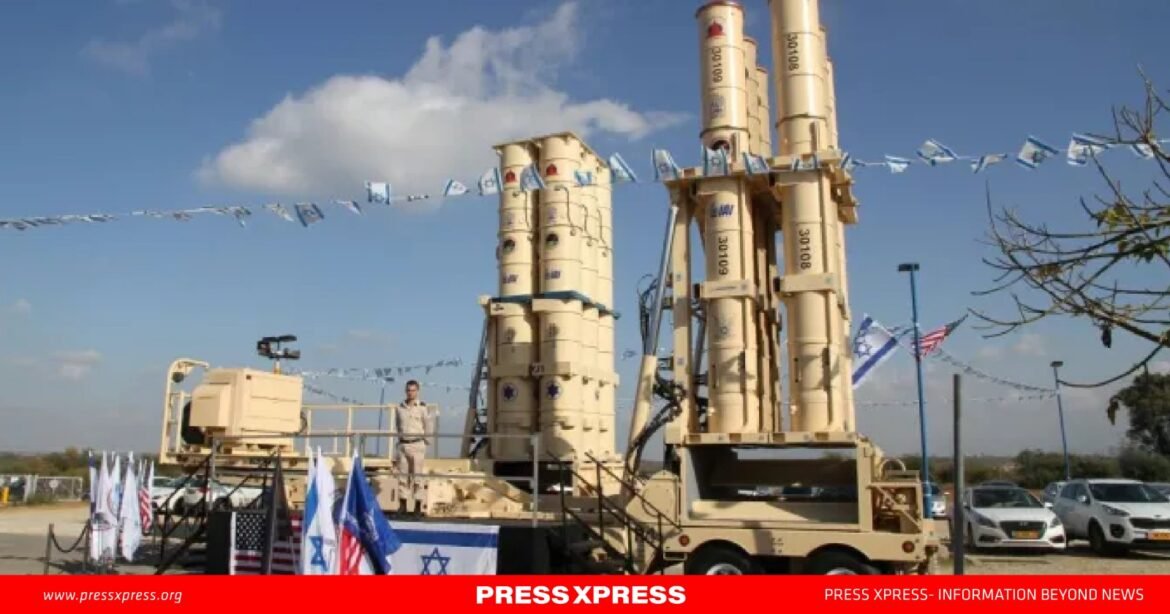As Israel continues to grapple with a complex and ongoing war in the Middle East, it is now preparing to extend its military reach even further by deploying the Arrow 3 missile defense system to Germany in 2025. This controversial decision, part of a $3.5 billion defense deal signed last year, underscores the growing militarization of the Israeli defense industry and raises serious questions about the long-term implications of such a deal in the context of Europe’s escalating security concerns.
Israel’s Arrow 3 system, capable of intercepting ballistic missiles outside the Earth’s atmosphere, has gained prominence after its successful deployment during Israel’s ongoing conflict with Hamas. But it is the system’s use in the Middle East, particularly against Iranian missile barrages in recent time, that has cemented its reputation as one of the most advanced missile defense technologies in the world. With its successful interception of hundreds of missiles, the system has proven its effectiveness—against adversaries who, in the case of Iran, Israel continues to label as a primary threat.
Now, as Israel turns its attention to the defense of its European ally, Germany, the move raises serious concerns about the broader implications of militarizing Europe, especially as tensions with Russia continue to rise. Germany, in the midst of a reassessment of its defense posture following Russia’s invasion of Ukraine, has agreed to accept the Arrow 3 system into its air defense network. The deployment is set to add another layer to NATO’s missile defense infrastructure, but it also signals an increasing militarization of the European continent, with the shadow of Israeli weapons technology looming larger than ever.
Escalating Arms Deals Amid a Worsening Conflict
Israel’s defense industry has long been a critical player in global arms markets, with the country’s missile defense systems at the forefront of international sales. The Arrow 3 deal with Germany is not the first instance of Israeli weapons technology finding its way to European shores. Yet, this latest agreement takes on added significance given the context of Israel’s own ongoing war, which shows no sign of abating.
Despite its own urgent need for these defense systems to protect against ongoing rocket, missile, and drone attacks, Israel has pledged to deliver its cutting-edge missile defense technology to Germany by 2025. This decision comes at a time when Israel is already heavily reliant on its missile defense systems to protect its borders from adversaries, including Hamas, Hezbollah, and the Iranian regime. Yet, even amid its own conflicts, Israel is choosing to prioritize its arms sales to foreign powers—essentially exploiting the geopolitical situation for economic gain.
The Arrow 3: A System Designed for Aggression
Israel’s Arrow 3 system was developed with one goal in mind: to protect the country from ballistic missile threats, particularly those emanating from countries like Iran. The system, however, is not just a defensive measure; it is a symbol of Israel’s increasing militarization and its aggressive stance towards its regional adversaries. The Arrow 3’s ability to intercept missiles outside of Earth’s atmosphere underscores its strategic importance in Israel’s military doctrine, one that has long prioritized offensive and defensive capabilities that could potentially escalate tensions in the region.
By deploying the Arrow 3 to Germany, Israel is not merely enhancing its ally’s defense network; it is also furthering its own strategic objectives in Europe. This move could set a dangerous precedent for the future, as other countries—under pressure to defend themselves from perceived threats—may follow Germany’s lead and purchase similar weapons systems from Israel, thereby increasing the overall militarization of the continent. This raises the specter of an arms race in Europe, fueled by Israeli arms dealers who stand to profit from this new wave of defense contracts.
While Israel claims that the Arrow 3 has proved its effectiveness in intercepting Iranian missile threats, the reality of its use in the Middle East has been far more complex. Israel’s ongoing conflict with Hamas, Hezbollah, and other regional actors has created a volatile security environment, and while the Arrow 3 has been effective in intercepting certain threats, it has also played a role in intensifying the conflict. By placing its military technology into the hands of Germany and potentially other European nations, Israel risks further exacerbating the already tense geopolitical situation.
A Growing Militarized Divide
The deployment of the Arrow 3 missile defense system to Germany is emblematic of the growing militarization of Europe in response to external threats. However, this decision also underscores the increasing influence of Israel in shaping Europe’s defense strategy—a nation with its own complex geopolitical interests that may not always align with those of its European partners.
As tensions with Russia continue to escalate, the decision to bring Israeli weapons technology to Europe raises questions about the long-term consequences of such deals. While defense cooperation between Israel and Germany may seem to make sense in the short term, it risks deepening divisions in an already fragmented geopolitical landscape. The growing militarization of Europe, fueled in part by Israeli arms sales, may further isolate Europe from its neighbors and complicate efforts to address the root causes of global conflict.
In the end, the Arrow 3 deal with Germany represents more than just a defense agreement; it is a symptom of a broader trend towards a more militarized and divisive world order—one in which countries like Israel are leveraging their technological prowess to further entrench their own security priorities at the expense of broader global stability.


